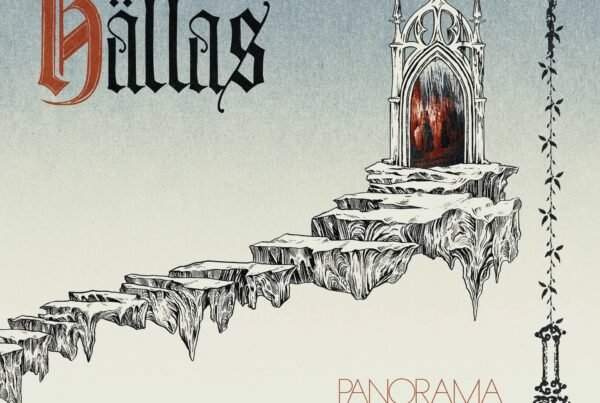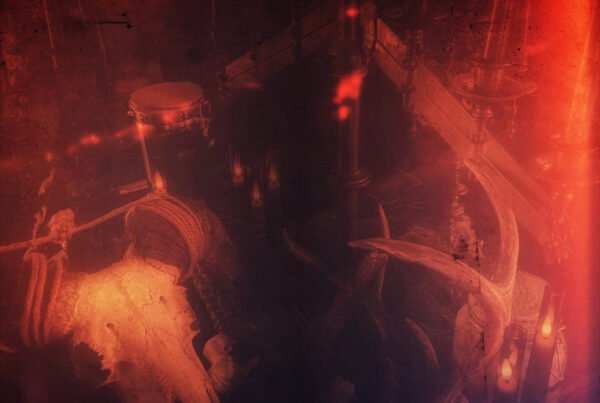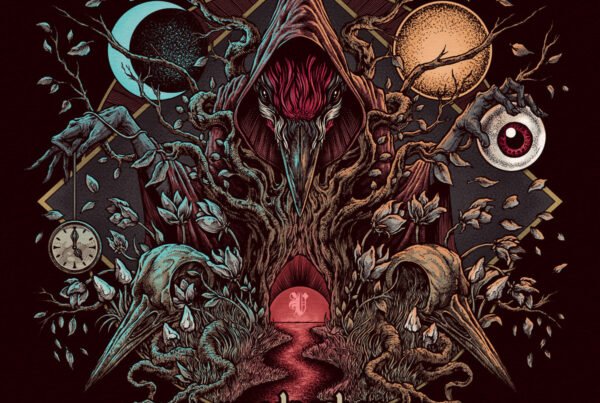We’re nearing the end of August, and the summer heat is slowly taking a backseat to more moderate temperatures. A faint touch of autumn is in the air already, much to my confusion. ‘But what does this have to do with this Review Rundown thing you are about to do?‘, I hear you ask. The answer is: nothing, nothing at all. I just needed a segue into this article, so here we go. Five writers, ten short reviews; from art pop to mathcore, neo-classical to industrial metal. We cover a lot of ground in this episode once again, so strap in and enjoy the ride!
P.S.: You can find the older episodes of the feature right here.
JONCE
An uninhibited, unwarranted, unstoppable assault on the ears – that’s how I would sum up Unloved from front to back. Frontierer unleash a sound that has about as much regard for human life as that of an old Cannibal Corpse track. On their sophomore effort, they supply another hour’s worth of synthetic, bludgeoning guitars and drums underneath a constant vocal howl…
…pretty much to the point that listening to the full 56 minutes of this becomes pretty taxing pretty quickly. There comes a moment when I’ve heard enough wonky slides and down-tuned one-note riffs on Unloved to have heard them all.
There are 14 songs that are somewhere between three and six minutes in length, but they’re difficult to distinguish from one another, as if the same winding industrial bangers were re-arranged five or six times. It’s almost as if Unloved would be better formatted as one long song, Bell Witch-style.
Even though I love the Car Bomb-esque intensity that Frontierer brings to each track, they lack the dynamic contrasts found on Meta. Songs like “Glitcher” and “Bombgnasher” may be exciting, but the twisting transitions begin to make the ears dull at a certain point.
It’s as if an album of perfectly fantastic songs is working against itself, warping beyond a point of traditional enjoyment. Judging by the abrasive push-pull sound, dysmorphic cover art, and the title Unloved, maybe Frontierer simply dsn’t want this album to be liked in a normal way. So maybe Unloved is doing exactly what it was supposed to do.
Steven Alexander has released his debut EP Searching, and it has left me searching for something else to listen to.
Harsh, I know, but the only thing somewhat remarkable about it is how bland it all is. I hate to be so negative, especially since this seems like Steven’s first release, but the material on Searching doesn’t add up to very listenable music for me.
The opening guitar on “Heat” (and throughout the track) sounds positively lifeless; as do the drums, vocal performance, and lyrics, for that matter. The horn and flute accompaniment definitely gives a breath of fresh air, but a breath of fresh air to what? A crusty piece of stale bread?
At least on “Lonely Room”, the vocals seem to betray some shred of evidence that Steven actually cares about what he’s singing about. The best musical moment on Searching can be found here, at the swathy interlude in the middle of track.
A few months ago I reviewed a band called Adjentist that had a similar problem as Steven Alexander. Their performances were in tune, they had great riffs, and their lyrics were decent enough. But for whatever reason, their music just didn’t gel for me when it all came together. The only difference here is that at least Adjentist was trying, which is more than I can say for the people involved in the making of Searching.
ANDREW
Dear ERRA,
You could have done something great here, but you wrecked your chances by committing three unforgivable blemishes to your fourth album, Neon.
First, you continue to insist that growled vocals are a vital and defining aspect of your music. It is almost as if you are afraid that some idiots commenting on Facebook will call you ‘cucks’ or whatever for having only clean vocals. My beloved, dear ERRA, such straw man metal elitists do not exist in significant numbers. They just whine louder than everyone else. You should ignore them. Seriously, the growls add nothing to your music. They do not make it heavier. They do not make it more interesting or more distinctive. They just make it look like you are trying too hard. This is a very bad thing for a band that wants to be ‘prog’. Please kick J.T. Harvey out of the band as soon as you can. He has zero stage presence anyway.
Moving right along…
Second, you keep trying to sound like Periphery. The ‘more chugs than a frat party’ approach does not work for ERRA anymore. Even Periphery do not sound like Periphery anymore, and they are a better band for it. You had a great thing going on Neon with songs like “Monolith” that have a post-rock, 90s revival feel to them. And yes, they are original. Songs like that and “Signal Fire” sound like they were from the album that Suicide Silence thought they made last year, instead of the embarrassing failure that it was. Too bad the rest of Neon sounds like it could have been on Augment, which was OK by 2013 standards, but not now.
Third and finally, your production. The guitars on Neon sound like an old TV tuned to a dead channel in a distant room, while the vocals are too high in the mix. This is bad. The vocals are not ERRA’s strong point. The guitars are.
We love you, ERRA, so we want to see you grow. And to hear something like Neon just breaks our hearts. Please work on that.
Alaskan Tapes – You Were Always An Island
Alaskan Tapes follows the contemporary trend of solo composers adopting an imaginative nom de plume under which they release music. In this case, it is the project of Toronto-based Brady Kendall. You Were Always An Island is his seventeenth overall release.
No song is an island on this album. It would make no sense to listen to any single part of it apart from the others. Nearly all of them start with a slow crescendo that leads into some minimal soundscape or other, but any one of them heard on their own would sound like awkward deviations from whatever was heard before and after them. A case in point would be one of the albums two vocal numbers, “Skin”: it has minimal lyrics and instrumentation while being structured as a rarified coda that sets up the instrumental “Ruins” that follows it. The instrumental tracks work in exactly the same way: minimal structure and articulation to set up whatever comes after it. Even the album’s finale, “In Trenches”, seems to suggest something after it (perhaps we should wait for the next Alaskan Tapes album). No, You Were Always An Island needs to be listened to in its 39-minute entirety.
For contemplative chill-out music, You Were Always An Island works. For being a unitary artistic statement, it only works in part; but Kendall probably wanted it that way.
JAKE
One thing that I didn’t know my life was missing was a healthy dose of industrial post-metal. Drift is an EP filled with some fantastic moments by a still relatively unknown outfit, Bliss Signal. The mixing of these styles makes a fair amount of sense in theory, and thankfully Drift ensures that this works out practically as well. The title track starts things off in brighter fashion than I expected with an energetic upbeat and plenty of audible fizz. It’s a pleasant way to begin this three-song affair, but overall I would have liked a little more substance given the limited amount of time they have my attention.
“Swarm” is the second song, and it ups the dynamics a bit with some pulsing rhythms that get pretty relentless. There’s also a swell atmospheric package near the midpoint and it wraps up with a noisy, chirping conclusion. The final song “4AM Drift” channels some black metal riffage at the start with phasers and percussion winding things down. When I came across this EP I was immediately struck by the sonic impact that it makes and how integrated the styles are. The EP does lack some diversity, but Bliss Signal have a solid formula and I hope to hear more from them in the future.
Here at Everything Is Noise we love complex, difficult music. One (perhaps valid) criticism of music in this vein is that it can get away with mediocre songwriting if the composition is engaging. Contrasting these ideas, at least in my eyes, are albums that reduce complexity significantly and succeed or fail based on the quality of the songs. Enter the debut of one-woman act Tomberlin, At Weddings. Blending ambient pop and folk in a way similar to Iron & Wine, this collection of ten songs is both deeply emotional and melodic. With the instrumentation being mostly limited to guitar and atmospheric effects, the strength of the record will have to stand on the lyrics and songwriting.
While there are many memorable tunes At Weddings, one that really stands out is the candid “I’m Not Scared”. The piano-driven tune is one of the simplest on the record, but the melody is instantly classic. It’s one of the best written songs I have heard all year as the melody, lyrics, and atmosphere are in perfect harmony. The lyrics are tragic and reflective and the mood of the song is decidedly melancholic, but therein lies the beauty. At Weddings is a fine debut, and Tomberlin an act to watch. I see great things ahead.
TIM
Black metal is great! It’s an ingredient you can use for so many things, like making bread or muffins or…wait, that’s flour; I’m talking about flour here. But black metal is just as versatile as flour! Having spawned countless subgenres, this once grim and frostbitten music has evolved in ways one could’ve never imagined when seeing where it started. There are a lot of bands pushing the boundaries of the genre, but a very particular one is Violence Mortuaire. Their record Quidam encapsulates elements of progressive metal, black metal, and bossa nova. The result is something you would probably hear in hell’s most fancy restaurant.
“Post Coma” is the first track, and leans more towards black metal than most other tracks. Harsh guitars, a man crying in the intro, and guttural, spine-tingling screams can be expected here. A real turnaround is brought by the second track, where a groovier rhythm is used, and occasional smooth jazz breaks give the listener something to wonder and gush about. A real play of both tropes is seen in “Post Judgement”, which features jazzy clean guitars between alternated chaotic solos and roaring vocals. At some point even the distorted parts hold a mellow and somewhat pleasant atmosphere. Quidam is a work of experimentation that really paid off, though it definitely is not for everybody. I’m sure it will turn some heads.
The Love Language – Baby Grand
This artist caught my eye solely based on the tags: chamber pop and garage rock. It was pretty clear that this artist is open to some unconventional approaches, but I still didn’t expect the record to be this good. At heart, Baby Grand is a pop record, sometimes shifting over to rock territory. Upon closer inspection, it is full of little, lovingly-placed details. “New Amsterdam” for example features synths arpeggiating chords perpetually, while shoegaze guitars bring a near numb flavor to the sometimes happy, sometimes sad vocal style. It’s like Nothing travelled through time and left their gear for a bard to find them and deliver the best show these folks have ever seen.
Speaking of gear, the tone and production on this LP are mindboggling. Very rarely have I heard such a unique blend of effects without sounding muddy or oversaturated. Everything is very natural and flows perfectly into each other. To not listen to this record should almost be seen as a crime.
DOM
Moses Sumney – Black In Deep Red, 2014
I honestly did not expect to hear new material from Moses Sumney so soon after the release of his début album Aromanticism (which I adored to no end) last year. His delightful mélange of soul, art pop, electronica, and folk presented us with one of the most vulnerable, intimate, and exhilarating pieces of music of 2017; following that up would prove to be a challenge even for seasoned veterans, let alone a relative newcomer.
But what can I say? Sumney effortlessly knocked it out of the park again with Black In Deep Red, 2014. This three-song EP is every bit as experimental and astonishing as we’ve come to expect from the Los Angeles-based singer-songwriter. Lead single “Rank & File” (which has been played at his live shows for a while now) is a political protest song, based on Sumney’s experiences at a protest march against the acquittal of a police officer in the case of the Mike Brown murder back in 2014. This lyrical and conceptual weight is balanced out by a lofty, rhythm-focused instrumental, and Sumney’s once more expressive, versatile vocal work.
The other two songs are no slouches, either. The opening “Power?” is a rousing plea for giving power to the people. Built around a sampled group chant, it comes across as an electronically enhanced gospel song taken to the streets by an exasperated community. Meanwhile, “Call-to-Arms” features only non-lyrical vocalizes of Sumney, set against a wonderfully detailed bedrock of guitars, handclaps, percussion, saxophone, and electronics.
Mulatu Astatke – Afro Latin Soul (Vols. 1 & 2)
Trying to hastily distill his legacy into only a few choice words would do a huge disservice to Ethiopian multi-instrumentalist Mulatu Astatke; after all, the man known as the father of Ethio-jazz has had such a storied, impactful career over the past 55+ years that it’s impossible to condense his œuvre into a few empty phrases and just move on. Therefore, I will bypass the obvious and simply discuss the topic at hand: the re-release of his 1966 records Afro Latin Soul Volume 1 and Volume 2.
As the title suggests, these two records (spanning 19 tracks in total) are devoted to delivering a decidedly African take on the popular jazz, Latin music, and soul tropes of the 1960s. Astatke and his Ethiopian quartet fill this lofty premise with life in a wonderfully nimble-footed and danceable fashion, each track being a fiery concoction of sheer passion and musicality. Highlights include, but are certainly not limited to, the following songs: “ I Faram Gami I Faram”, “One For Buzayhew”, “Almaz”, “A Kiss Before Dawn”, “Konjit (Pretty)”, “Love Mood For Two”, and “Girl From Addid Abeba”.
These records should do you good services, no matter the occasion. Sweaty dancefloor to fancy dinner party, they’re always fitting and trusty companions thanks to the broad array of moods and styles they provide. You should not miss out on this blast from the golden past of Ethiopian music. This re-release is as rewarding a listen as they come.
Thanks for scrolling through. Come back in two weeks for more Review Rundown-age.






